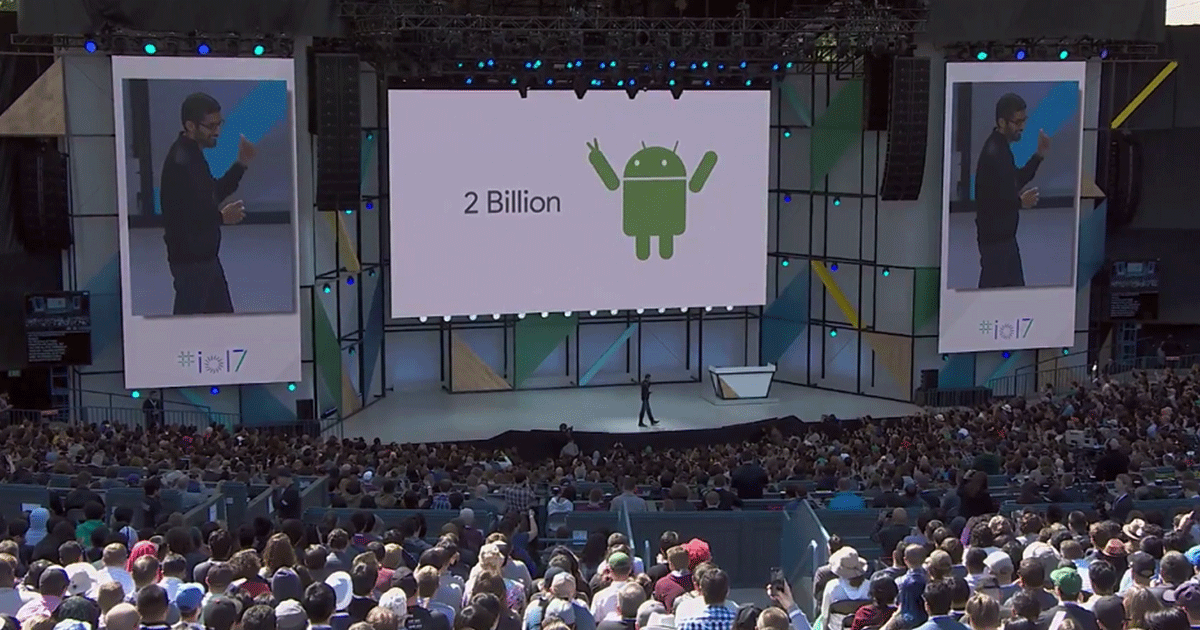Google has launched its annual developers conference, the I/O, last Wednesday, over 7000 visitors joined in on the event with many more watching the live broadcasts.
The 2017 conference will last 3 days, and has been anticipated by many in the tech world as they await what they assume to be updates on Google’s artificial intelligence products and system, virtual reality, and to its mobile operating system Android.
Last year, Google stepped out with two messaging apps, a home assistant and announced Daydream, a VR headset that would not use PCs as its main source like Facebook’s Oculus Rift and HTC Vive. This year, Google wows the crowd with a variety of new updates and releases.
Android surpasses 2 Billion active devices
The popular mobile operating system continues to gain momentum, CEO Sunder Pichai announced that Android has currently exceeded 2 billion active devices. These include smartphones, tablets, Android Wear devices, Android TV and other devices.
- Advertisement -
Saving the world, one AI chip at a time
CEO Pichai publicly announced Google’s specially designed artificial intelligence (AI) chips last year. This year, he speaks on how their AI has been solving multiple problems. The Google CEO stated that their AI machine learning “provid[es] tools for people to do what they do, better,” and continues on to discuss how the AI is being used to help health care professionals to diagnose illnesses such as breast cancer with better proficiency.
It would seem that, as Facebook is currently focusing on Augmented Reality and their own AI, Google is following Facebook’s footsteps in walking towards an AI dominated future. The new Tensor Processing Unit, a specially designed chip for machine learning, is set to provide Google with the capabilities to build their AI faster and more efficiently.
If the chip and AI can work together, Google’s products could be used by the majority of researchers in the AI field, making it a valuable player in the future of that industry.
A better understanding of the world; using AI, Google Lens and your phone
Google Assistant has been given an upgrade with new AI and a program called Google Lens. Google Lens will allow Google’s assistant app to be more efficient at understanding images in real time. It will analyze the surrounding area within a photo or what is being shown on camera in real time, just like what Facebook announced they would do with an AI update to their apps, also what Pinterest has been working on for a while with a similarly named app.
.@google Well this is awkward… https://t.co/zwH7Lq6afg
— Pinterest Lens (@PinterestLens) May 17, 2017
Users will be able to identity locations such as restaurants and provide its Google maps’ ratings, identify different types of flowers, even log onto a Wi-Fi connection by pointing the camera at the router’s credentials. The most promising and biggest-wow factor came from its ability to allow users to delete obstacles to photos, earning a large applause from the audience.
https://twitter.com/mattburgess1/status/864897531263713280
The future of job-hunting; quick and easy search engine
Google will be launching a new addition to their Google search engine that will provide job seekers the ability to find job postings according to their location and other variables. This was created to enable job seekers and companies to easily find what they are looking for, rather than going through different websites that may or may not be updated.
This addition will start rolling out within the next couple of weeks to the USA and then to the rest of the world, so we can assume it will reach Egypt by mid-summer.
Other highlights
- Google has put all of its AI work and services under one wing called Google.Ai, such as AI research and product development.
- Google’s AI can now answer your email with Gmail’s “smart replies” with better and more casual answers. Smart Replies has been noted to work in Egypt now, but is currently only available on the Gmail app on phones.
- YouTube’s 360 videos are now more compatible with TVs
- Google Photos now has a lower visual error rate for recognizing faces than human beings.
- Google announces a stand-alone virtual reality headset that will not need a computer to work called Daydream view
- Google CEO states that with Autodraw “Even I can draw with this thing,” and “Things like this makes them [AI] creative and gain knowledge.”
- VPS, Visual positioning service, will be the new GPS for indoor locations. Allowing users to find items in large locations like IKEA with ease and accuracy, using a similar system to Google map’s drive and navigation system.








